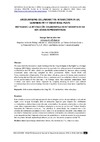Identificador persistente para citar o vincular este elemento:
https://accedacris.ulpgc.es/jspui/handle/10553/58488
| Campo DC | Valor | idioma |
|---|---|---|
| dc.contributor.author | García Sánchez, Soraya | - |
| dc.date.accessioned | 2019-12-16T15:52:48Z | - |
| dc.date.available | 2019-12-16T15:52:48Z | - |
| dc.date.issued | 2016 | - |
| dc.identifier.issn | 0214-4842 | - |
| dc.identifier.other | Dialnet | - |
| dc.identifier.other | WoS | - |
| dc.identifier.uri | https://accedacris.ulpgc.es/handle/10553/58488 | - |
| dc.description.abstract | Este estudio se centra en la implementación de estrategias activas de aprendizaje en el aula de Inglés como Lengua Extranjera (ILE) de educación superior para mejorar las habilidades comunicativas, colaborativas y digitales que contextualizan los propios estudiantes a la hora de crear vídeos representativos (role-plays) adaptados a su ámbito profesional: Trabajo Social e Ingeniería de Telecomunicaciones. Tras planificar la metodología, las competencias y los criterios de evaluación asociados con esta tarea oral, se analizaron cincuenta y dos vídeos. Los resultados demuestran que las interacciones entre los estudiantes, los contextos especializados y sus necesidades han mejorado el proceso de aprendizaje a través de escenarios que suceden dentro y fuera del aula (aprendizaje ubicuo), y que, con frecuencia, se apoyan de las TIC | - |
| dc.description.abstract | Abstract:This case study has focused on implementing active learning strategies in the English as a Foreign Language (EFL) higher education classroom to promote the enhancement of communicative, collaborative and ICT skills, which are specifically contextualised by learners when creating situational video role-plays adapted to their professional fields: Social Work and Telecommunications Engineering. Fifty-two video role-plays, created by teams, were examined after having planned the methodology, the competences and the evaluation criteria to succeed in the performance of this oral task. The findings reveal that students’ interactions, field contexts, and needs have been improved by adapting learning to within and without communicative class scenarios (ubiquitous learning) that, on occasions, have been supported by ICT.P | - |
| dc.language | eng | - |
| dc.relation.ispartof | Ensayos-Revista De La Facultad De Educacion De Albacete | - |
| dc.source | Ensayos: Revista de la Facultad de Educación de Albacete [ISSN 0214-4842], v. 31 (1), p. 149-164 | - |
| dc.subject | 58 Pedagogía | - |
| dc.subject | 570111 Enseñanza de lenguas | - |
| dc.subject.other | Collaborative ubiquitous learning | - |
| dc.subject.other | EFL | - |
| dc.subject.other | ICT | - |
| dc.subject.other | Motivation | - |
| dc.subject.other | Video role‐plays | - |
| dc.subject.other | Aprendizaje colaborativo ubicuo | - |
| dc.subject.other | ILE | - |
| dc.subject.other | Motivación | - |
| dc.subject.other | TIC | - |
| dc.subject.other | Video role‐plays | - |
| dc.title | Encouraging EFL interaction with video role-plays | - |
| dc.title.alternative | Motivando la interacción colaborativa en estudiantes de ILE con vídeos representativos | - |
| dc.type | info:eu-repo/semantics/article | - |
| dc.type | Article | - |
| dc.identifier.isi | 000393515700011 | - |
| dc.identifier.url | http://dialnet.unirioja.es/servlet/articulo?codigo=6535207 | - |
| dc.identifier.eissn | 2171-9098 | - |
| dc.description.lastpage | 164 | - |
| dc.identifier.issue | 1 | - |
| dc.description.firstpage | 149 | - |
| dc.relation.volume | 31 | - |
| dc.investigacion | Artes y Humanidades | - |
| dc.type2 | Artículo | - |
| dc.contributor.daisngid | 3075046 | - |
| dc.contributor.authordialnetid | 3849766 | - |
| dc.identifier.dialnet | 6535207ARTREV | - |
| dc.description.numberofpages | 16 | - |
| dc.utils.revision | Sí | - |
| dc.contributor.wosstandard | WOS:Garcia-Sanchez, S | - |
| dc.date.coverdate | Enero-Junio 2016 | - |
| dc.identifier.ulpgc | Sí | es |
| dc.description.esci | ESCI | |
| dc.description.dialnetimpact | 0,0 | |
| dc.description.dialnetq | Q2 | |
| dc.description.erihplus | ERIH PLUS | |
| item.fulltext | Con texto completo | - |
| item.grantfulltext | open | - |
| crisitem.author.dept | GIR Discourse, Communication and Society | - |
| crisitem.author.dept | Departamento de Filología Moderna, Traducción e Interpretación | - |
| crisitem.author.orcid | 0000-0003-1095-9410 | - |
| crisitem.author.parentorg | Departamento de Filología Moderna, Traducción e Interpretación | - |
| crisitem.author.fullName | García Sánchez, María Soraya | - |
| Colección: | Artículos | |
Citas de WEB OF SCIENCETM
Citations
1
actualizado el 25-feb-2024
Visitas
123
actualizado el 01-nov-2024
Descargas
57
actualizado el 01-nov-2024
Google ScholarTM
Verifica
Comparte
Exporta metadatos
Los elementos en ULPGC accedaCRIS están protegidos por derechos de autor con todos los derechos reservados, a menos que se indique lo contrario.
